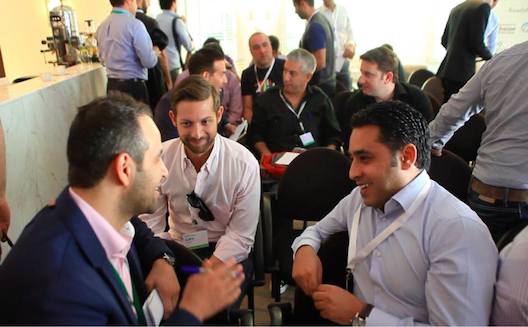Dubai entrepreneurs pick VC brains with these 6 questions


Last Saturday, Wamda closed out yet another fruitful Mix N’ Mentor Roadshow. This year’s last event took place at the in5 Innovation Hub, and hosted some of Dubai’s most active entrepreneurs, mentors, and industry experts. We also benefitted from the advice and insight of global experts including Jonathan Labin, Facebook's Head of the Middle East, Africa, and Pakistan; Narain Jashanmal, Client Partner Retail & eCommerce at Facebook MENA; LMTD founder Will Hutson.

May Medhat, cofounder of Eventtus
The day was divided into four parts: 1) hour-long morning sessions centered around fundraising, team building and business development, 2) one-on-one sessions between mentors and entrepreneurs, 3) hands-on workshops centered around digital content, customer acquisition, public speaking, and investment, and 4) a fireside chat where entrepreneurs, mentors, and experts shared insights and conclusions from the day.

Not surprisingly, investment and VCs were the star topics of the day. Many valid questions where raised, answered by the mentors who interacted directly with the entrepreneurs, providing straightforward advice and tips specific to each startup.
We gathered six of those questions along with the mentors’ responses:
Entrepreneur: Should I organically grow my company or should I fundraise and give up equity?
Mentors:
- Knowing when to fundraise highly depends on where you are in
your scalability roadmap, as well as where you are in terms of
growth metrics, user acquisition, client acquisition, expansion
plan, hiring strategy, etc.
- Ask yourself: “where do I want to be in 12 months?” Can you
bootstrap or use revenues to get through your next 12 months or do
you need money? Do you also need strategic support or do you have
what is needed for those next 12 months?
- Investors see the same mistake: entrepreneurs trying to grow their companies organically because they are afraid to fundraise too early and prefer to do so only at a high valuation. One mentor’s advice is to manage your expectations of your potential valuation. If you’re in a disruptive field, then your main priority should be growing your company as fast as you can.
Entrepreneur: I’m still experimenting with my business model. Should I fundraise?
Mentors:
- Never ask investors if they like your business model; ask them
if they will invest in it. If you are just starting out, and you
don’t know your business model 100%, then you may want to go with
an angel investor rather than a VC.
- Your business model should be as fluid as possible because your
business needs to be reactive to the shocks in the field. A lot of
businesses fail because they refuse to change their
models according to changes in the field. You have to be
able to adapt.
- Entrepreneurs go the extra mile to please investors. Don’t go
around modifying your business plan just to impress a VC; if you
truly believe that this is the right thing to do then change it but
if you’re just doing it to impress VCs then you’re doing it for the
wrong reasons.
- Barely any investors I know invest in a one-man-show [running companies that are still testing their models]. We like to see strong, determined, and passionate teams. There’s a lot of money in the Arab world, if you can’t get money then there’s something wrong with your business.
Entrepreneur: I want to hold onto as much equity as I can. How much equity should I expect to give away at each stage?
Mentors:
- Investors in this region take too much equity. Don’t give up more than 30% at each fundraising stage. At the end of the day, always find a strategic investor. It doesn’t matter if this investor is local or global because money doesn’t build businesses, entrepreneurs do. If you find a global investor that you align with and you know they can give you that extra push, then go with them.
Entrepreneur: What’s your take on convertible notes?
Mentors:
- It depends on the party you’re talking to. If you want clean and quick, then convertible notes are the way to go, but not a lot of investors here like to do convertible notes.
“Asking about convertible notes is a sophisticated question
for a not yet sophisticated market,” says Pawel Ivanov, Managing
Director, Mountain Partners Middle East.
Entrepreneur: How to get from valuation to closing?
Mentors:
- Ask yourself: “How many rounds of funding should we plan
for?”
- Have a detailed plan for knowing how much money you will need
at each step of the way. And look at VC capital as phased rounds of
investment coming in incrementally larger amounts.
- So a final/overall valuation is not as appropriate for a pre-scale company as a roadmap of obtaining investment for the different phases in the business plan.
“Our interest is to see a company grow so that we can
advance to the next, bigger round of funding,” says Khaled
Talhouni, Wamda VC.
Entrepreneur: What homework can entrepreneurs do to convince VCs to close the deal?
Mentors:
- Look at your strategy and how big your business can become.
- Ensure proper compensation of the team. Unrealistic team
compensation is a turn-off for investors.
- Know what to negotiate on and what to let go.
- Investors want veto protection to block certain undesirable
things from happening. The majority of problems occur when
investors are not given certain rights.
- Don’t obsess about valuation negotiation, as long as it is within a fair range. There are more important terms to focus on. You can use earnouts as a way to bridge the gap between your expectations and that of the VC.


